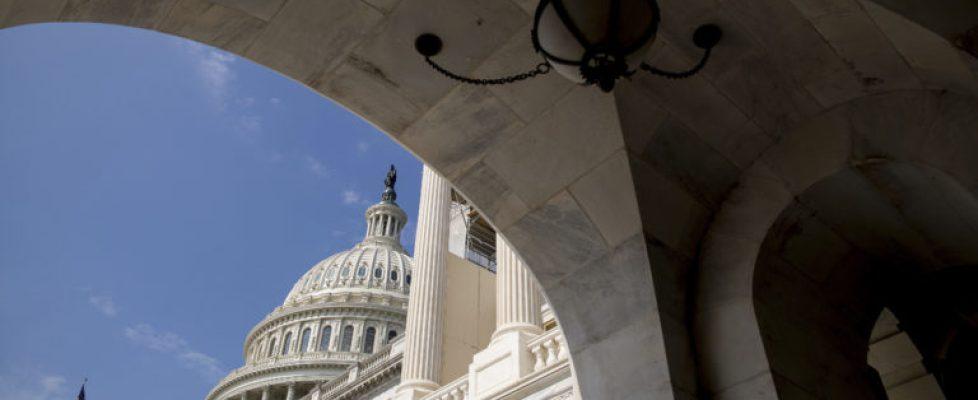Telehealth, hospital-at-home extensions pass key House committee
Bills that would extend expiring telehealth and hospital-at-home authorities and reverse a regulation establishing staffing mandates for nursing homes are ready for final votes in the House after committee consideration Wednesday.
The Energy and Commerce Committee met to vote on a number of healthcare bills at the session. Among them was the Telehealth Modernization Act of 2024, which passed unanimously.
The legislation would permit broader use of telehealth under Medicare for two more years and retain the Medicare hospital-at-home program for five more years. Both policies, due to run out Dec. 31, originated during the COVID-19 pandemic and providers have clamored for them to be reauthorized.
“We can all agree that one of the silver linings of the pandemic was unlocking the incredible potential of telehealth,” said Rep. Doris Matsui (Calif.), ranking Democrat on the panel’s Communications and Technology Subcommittee. “We need to ensure seniors can get the care they need when they need it. And I look forward to a future where we can recognize telehealth as a crucial piece of our healthcare system, rather than a temporary fix we must extend every two years.”
The legislation targets pharmacy benefit managers to finance these extensions via projected savings on Medicare prescription drug costs.
PBMs would be barred from linking compensation to drug list prices, be required to charge flat fees for negotiating prices, and have to provide extensive data to plan sponsors and federal regulators. PBMs have adamantly opposed such measures, arguing they would enrich pharmaceutical manufacturers.
The Energy and Commerce Committee also voted 21-18 along party lines to repeal the Centers for Medicare and Medicaid Services final rule that establishes minimum nurse staffing standards for nursing homes. Under that regulation, skilled nursing facilities must provide at least 3.48 hours of nursing care per resident, per day, including at least .55 hours from a registered nurse.
The mandate triggered vehement opposition from the American Health Care Association and other nursing home industry groups and met resistance on Capitol Hill, mostly from Republicans.
The skilled nursing facility industry and sympathetic lawmakers argue the requirements are too costly and will force nursing homes to close. According to the health policy research institution KFF, only about one in five nursing homes currently meets those benchmarks.
“The Biden administration is proposing an unfunded mandate that will decrease access to nursing homes for some of our most vulnerable patients living in my district and across the country,” said Rep. Buddy Carter (R-Ga.). “Nursing homes are not suffering from a lack of mandates. They’re facing a lack of nurses. This rule would only make things worse for our seniors and the healthcare providers who support them.”
Democrats have defended the rule, siding with nurses’ unions and patient advocates who maintain that minimum staffing levels are necessary to keep patients safe and allow nurses to do a good job.
“The evidence shows that, on average, more staffing helps, and it helps a lot,” said Rep. Diana DeGette (D-Colo.). “Mandating staffing is a the most serious idea anyone has come up with so far for improving nursing homes. We’re certainly not considering anything today that will address the crisis facing seniors.”
The fates of both measures is uncertain. Congress is approaching its pre-election recess in less than two weeks and is scrambling to advance legislation to keep the federal government open and sustain various programs past the end of the fiscal year on Sept. 30.
The telehealth bill has strong support in the GOP-led House and the majority-Democrat Senate. Whether it passes will depend on how Congress proceeds with funding bills and a collection of other healthcare measures. Lawmakers have been trying since last year to craft a broad healthcare package that could either move on its own or be added to a bigger spending measure.
The nursing home staffing mandate repeal is likely to pass the House if leaders bring it to the floor. The bill’s prospects in the Senate are less clear.
The staffing rule legislation is advancing under what’s known as the Congressional Review Act, which allows the legislative branch to invalidate new regulations within specific timeframes and provides expedited Senate procedures that allow passage on simply majority votes that aren’t subject to filibusters.
Democrats have a slim 51-49 Senate majority, including four independents who caucus with them. The staffing mandate bill could move forward if enough Democrats and allied independents join Republicans to scrap a major initiative from President Joe Biden. Sens. Jon Tester (D-Mont.) and Joe Manchin (I-W. Va.) have already joined Republicans who support repealing the rule.
But Biden almost certainly would veto a standalone measure to undo his signature nursing home policy.
Federal government funding runs out in 12 days, and advancing a spending bill has gotten enmeshed in 2024 election politics, complicating passage and efforts to attach healthcare measures to an appropriations bill.
A more likely scenario is that lawmakers find a way to pass the more popular and bipartisan measures after Election Day in a lame duck session, perhaps as part of a full-year spending bill.

